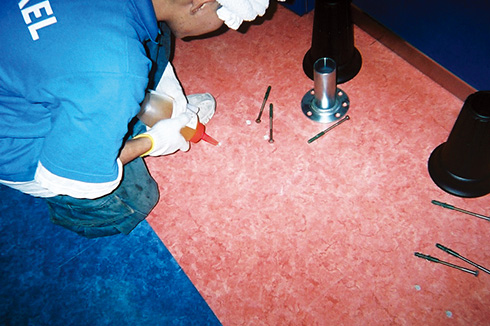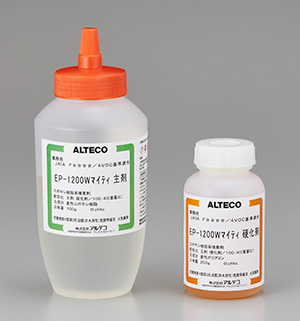Products

Low Viscosity Epoxy Adhesive for Civil Engineering and Construction
Concrete Structure Anchor Filling.
Bonding and Fixture of Sashes, Handrails, and Fixed Chairs.
Various Anchors and Bolts Fixing and Bonding.
Features
EP-1200W Mighty
Ready for use by pouring the hardener into the main agent bottle and mix.
No need for scales, mixers, or pumps—eliminating both equipment and measuring process.
Eliminates mixing errors and no messy operations.
The single-use, small-quantity kit is cost-effective, especially for smaller job sites.
Light weight and compact packaging suitable for use in tight spaces such as corridors and staircases, and easy to carry on-site.
Equipped with a pointed nozzle cap, allowing for easy injection into narrow holes.
Applicable on wet surfaces.
Solvent-free and contains no volatile components.
Minimal shrinkage after curing.
Low odor formula ensures a comfortable working environment.

Low VOC / Formaldehyde Emission
Compliant with JAIA F★★★★ and 4VOC standards – Japan’s strictest safety criteria for indoor air quality.
Suitable for use in living spaces requiring low chemical emissions.
Properties
| EP-1200W Mighty | ||
|---|---|---|
| Base Resin | Hardener | |
| Main Component | Modified Epoxy Resin | Modified Polyamine |
| Appearance | Colorless, Transparent Liquid | Pale Yellow, Transparent Liquid |
| Mix Ratio | 100:40 | |
| Viscosity After Mixing at 20℃ (m㎩・s) | 1000±500 | |
| Pot Life at 20℃ | 30min | |
Cured Material Properties
| Unit | Internal Standard | Test Procedure | |
|---|---|---|---|
| Specific Gravity | 1.18±0.05 | JIS K 7112 | |
| Compressive Yield Strength | N/㎟ | ≧60 | JIS K 7181 |
| Compressive Modulus of Elasticity | N/㎟ | ≧1.5×103 | JIS K 7181 |
| Bending Strength | N/㎟ | ≧50 | JIS K 7171 |
| Tensile Strength | N/㎟ | ≧35 | JIS K 7113 |
| Tensile Shear Strength | N/㎟ | ≧14 | JIS K 6850 |
| Hardness | HDD | ≧80 | JIS K 7215 |
| Impact | kJ/㎡ | ≧3.0 | JIS K 7111 |
Test temperature: 20℃
Anchor Bolt Installation Example
| Deformed Bar (D) Bolt Size (M) |
Hole Diameter (㎜) | Hole Depth (㎜) | Required Resin Amount (g) | Number of Applications per Set (pcs) | Yield Point of Steel (kN) | Allowable Tensile Stress (kN) |
|---|---|---|---|---|---|---|
| D6 | 9.0 | 50 | 2.3 | 304 | 10.9 | 7.3 |
| D10 | 13.0 | 60 | 5.2 | 134 | 24.6 | 16.4 |
| D13 | 18.0 | 80 | 14.5 | 48 | 43.7 | 29.1 |
| D16 | 20.0 | 100 | 16.3 | 42 | 68.5 | 45.7 |
| D19 | 25.0 | 120 | 34.7 | 20 | 98.8 | 65.9 |
| D22 | 30.0 | 140 | 63.3 | 11 | 133.5 | 89.0 |
| D25 | 34.0 | 160 | 90.8 | 7 | 174.8 | 116.5 |
| M8 | 10.0 | 50 | 3.0 | 233 | 8.6 | 5.7 |
| M10 | 12.0 | 60 | 4.7 | 148 | 13.6 | 9.1 |
| M12 | 14.0 | 70 | 6.9 | 101 | 19.8 | 13.2 |
| M16 | 18.0 | 100 | 13.8 | 50 | 36.9 | 24.6 |
| M20 | 24.0 | 120 | 35.2 | 19 | 57.5 | 38.4 |
| M22 | 28.0 | 140 | 61.9 | 11 | 71.2 | 47.5 |
| M24 | 32.0 | 150 | 95.8 | 7 | 83.0 | 55.3 |
●The yield point of the rebar steel is the value obtained by multiplying the nominal cross-sectional area by the reference strength of SD345, 345 N/mm².
●The yield strength of the steel for the full-thread bolt is the value obtained by multiplying the base strength of SS400, 235 N/mm², by the effective cross-sectional area.
●Do not use for items with smooth surfaces, such as round bars, which may not exhibit sufficient strength.
●The number of applications per set (pcs) is approximate.

